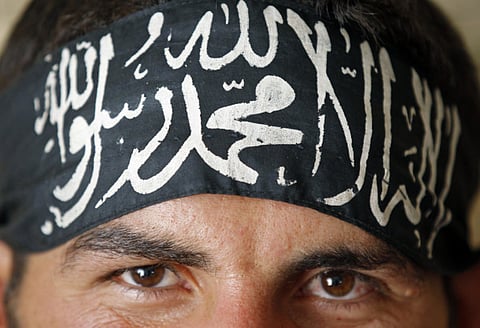Riyadh steering citizens away from Syrian war
Saudi trying to stop citizens from joining what some see as a holy war against Syria regime

Jeddah: Loath to foster a new generation of militant Islamists, Saudi Arabia is trying to stop its citizens from joining what some of them see as a holy war against the Syrian government.
The Saudi public has grown incensed at the bloody images continuously broadcast of Syria’s violence alongside reports of government forces massacring civilians, and $140 million was raised for Syrian refugees in the first two weeks of a government-organized campaign in August.
Riyadh has backed the rebels battling President Bashar Al Assad, publicly calling on the international community to “enable” Syrians to protect themselves, while sources in the Gulf, Syria and Turkey have said it is secretly funneling money and arms to the Free Syrian Army.
But mindful of the consequences it previously suffered after Saudi nationals returned home from foreign conflicts politically fired up and ready to wage war on their own government, Riyadh has moved to prevent volunteers from going to fight in Syria.
Islamists in Saudi Arabia denounce Al Assad and his regime but in June, Ali Al Hakimi, a member of the Senior Judicial Council, a government-appointed religious body, said in response to calls for jihad on online forums that this was forbidden unless permitted by the authorities. He added: “Some individual actions can place the state in an awkward position.”
Another cleric, Siraj Al Zahrani, was quoted in Okaz daily last week expressing regrets he had participated in jihad in Afghanistan in the 1980s and warning “families must watch over sons who can be lured into the hot spots in this world”.
“It’s illegal to go abroad and get involved in any... military actions or fighting. This is known to all Saudis and many people have been prosecuted,” said Mansour Turki, the Interior Ministry security spokesman.
“If we have evidence that somebody is leaving Saudi Arabia for the purpose of joining militants he will be stopped and investigated for that,” he said, adding that the authorities had no evidence that Saudis had travelled to Syria so far.
“If you allow these things to go on, you are effectively militarising society. And if you allow your people to get involved in these things and the so-called jihad, other people use it against you,” said Saudi analyst Khalid Al Dakhil.
Some Saudis already appear to be fighting in Syria alongside anti-government rebels, but in seemingly much smaller numbers than during Iraq’s civil war last decade, analysts say.
In an online film called “A message from a Saudi fighter with his Syrian brothers”, a young Saudi hunched against a wall clutching a rifle alongside rebels wearing bulletproof vests and carrying bazookas.
“I ask God to unite us in heaven and say to my brothers in the Arabian peninsula to fight in the name of God as your brothers in the Levant need fighters of strong faith and chivalry,” he said in a Saudi accent.
The video, posted on August 16, has been watched more than 121,000 times, according to YouTube, hinting at the allure of jihad in a war constantly broadcast on both private and state-run Arabic satellite channels.
A Gulf source familiar with military movements in the region said thousands of Saudis had sought to head to Syria to join the uprising against Al Assad, although there is little evidence that many of them have succeeded.
“Saudi fighters went into Syria to fight with the rebels... These fighters are from the people and not official fighters,” the source said, adding they were entering Syria via Turkey and Jordan and that some had been captured.
Those who have gone, caught up in the spirit of adventure and religious zeal, are following a well-trodden path.
Sign up for the Daily Briefing
Get the latest news and updates straight to your inbox



